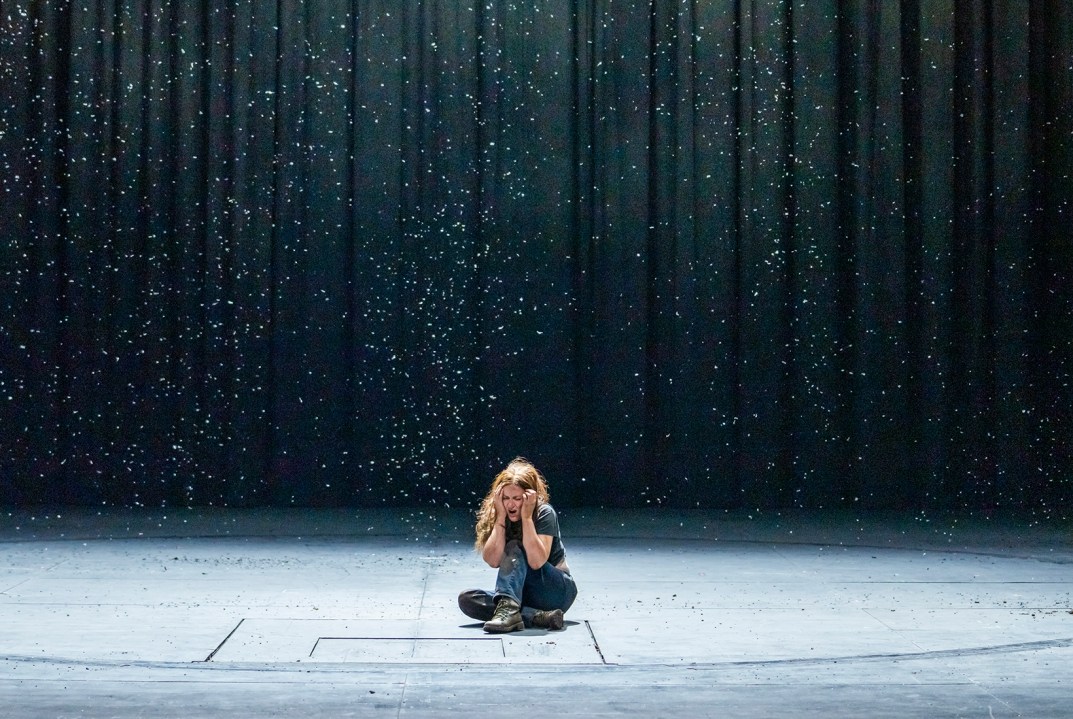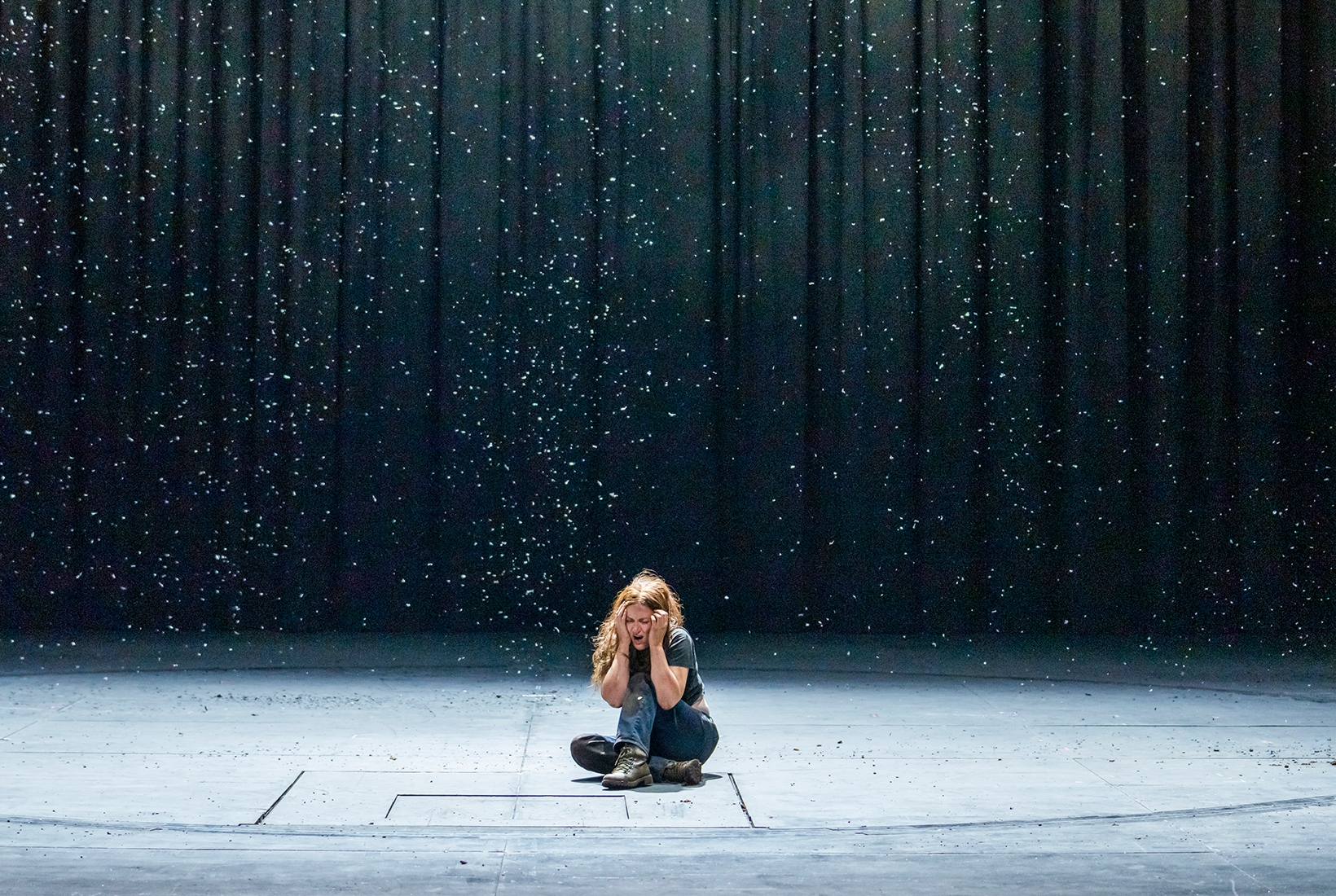It’s the final scene of The Valkyrie and Wotan is wearing cords. They’re a sensible choice for a hard-working deity: practical but with a certain retro flair. Slumbering under a red puffer jacket lies his daughter Brünnhilde, and as Wagner’s music yearns and flickers, the Lord of Ravens shuffles slowly around on all fours, methodically attaching the carabiners for the climactic flying effect. First one, then another. Then another. Four more to go! Possibly we’re not meant to be seeing this. Possibly it was meant to be obscured by the ‘large final fire effect’ that a slip in the programme tells us has been cut (‘despite extensive planning’) at the last minute. But right now, this is the climax: the moment of catharsis after five hours of wrenching music-drama. A hipster dad doing a spot of DIY.
Well, that’s live theatre, says the critic with his complimentary ticket. If I’d paid £180 for a seat I might be wondering why English National Opera couldn’t at least have mustered a bit of stage smoke. Or a video projection, whatever — even an orange spotlight with a flame-effect gobo would have been an improvement on this bathetic shrug of defeat. Coming at the end of an evening peppered with miscalculations and simple bad luck — noises off, sets that resembled trip hazards, one principal succumbing to a cold and another who already had — it reinforced a growing impression that ENO was presenting a paying audience with a slightly shaky dress rehearsal, rather than a finished show.
Brünnhilde is a sk8er grrl with brand-new Nikes and a voice of pure sunlight
True, the first part of a projected Ring cycle is always a work in progress, but Richard Jones’s conception felt under-realised. The setting is dystopian-contemporary. The Valkyries wear green cagoules, and Hunding (Brindley Sherratt) is a backwoods survivalist, whose T-shirted minions loll around his hut forking canned food straight from the tin. Outside, the forest is a tangle of blasted trees: this, and occasional showers of ash, showed Stewart Laing’s designs at their most haunting. On the other hand, the blank, grey-curtained space for Act Three looked as if they’d simply run out of ideas (or possibly budget). Jones and Laing filled it with two-legged pantomime horses that lurched and pranced to ludicrous effect.
That was as bad as it got (assuming they fix the fire): an overall ratio of something like 40 per cent sublime to 60 per cent ridiculous. But that 40 per cent is real enough, and it’s largely down to the cast and the conductor, Martyn Brabbins, who kept the orchestra on a medium simmer for long stretches but really blazed when the crunch came. Jones does create plausible human relationships, at least for the characters that interest him. Those that don’t go the way of Sherratt’s Hunding, whose deathly black voice and clenched malevolence was squandered in spasms of cartoon brutality. An indisposed Susan Bickley mimed the part of Fricka while Claire Barnett-Jones sang from a box.
But Siegmund (Nicky Spence) sounded stirring despite his cold and Sieglinde (Emma Bell) was tremendous: a woman quivering with trauma, never physically relaxed but letting her voice cut loose in new-found exultation — free, wild and drenching the auditorium in its richness and rapture. Bell, like the whole cast, takes advantage of John Deathridge’s sometimes bumpy English translation to snarl and whisper crucial words. The immediacy is striking. Wagner was explicit about wanting English–language performances for English-speaking audiences, and it’ll do the prissier Wagner snobs no harm at all to be reminded that his words have real and often troubling meanings.
Brünnhilde (Rachel Nicholls), meanwhile, is a sk8er grrl with brand-new Nikes and a voice of pure sunlight: deliberately childlike before Matthew Rose’s Wotan, and just as radiant even while — with acting of remarkable naturalness and subtlety — she outgrows him. As a father-daughter relationship, it’s agonisingly real, and their parting is a moment of absolute, tear-stained devastation. It didn’t matter that by this point, Rose’s majestic tone was starting to crack. The tragedy felt real: probably the strongest indication that this erratic Valkyrie contains the seeds of a worthwhile Ring. But there’s a lot to fix first.
I’d heard great things about the Norwegian baroque violinist Bjarte Eike, and last week he brought his Barokksolistene to the Middle Temple for one of its Alehouse Sessions. The basic idea is that we’re in a boozer in Restoration London, and the ten musicians improvise, sing and swig from bottles of Stella as they stamp and play. A grey-haired guitarist jumps to his feet and starts throwing blistering dance moves. ‘He’s 62, you know’ yelled Eike, to whoops and cheers, as they segued from Purcell fantasies to sea shanties to what sounded like a blues filtered through a Dowland lament. At one point, he led the audience in a 17th–century drinking song and seriously, you haven’t lived until you’ve heard a hall full of pinstriped QCs bellowing like dockers.







Comments